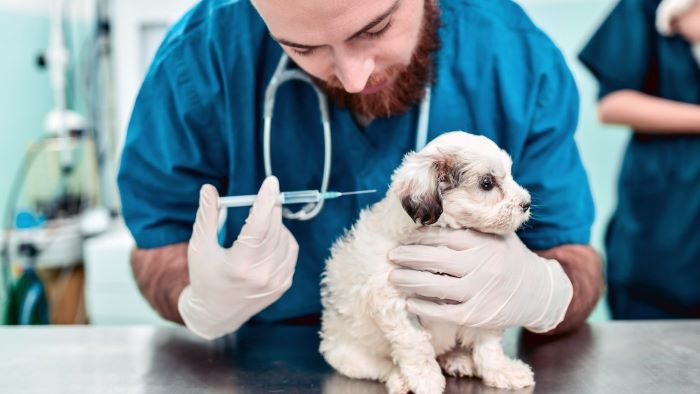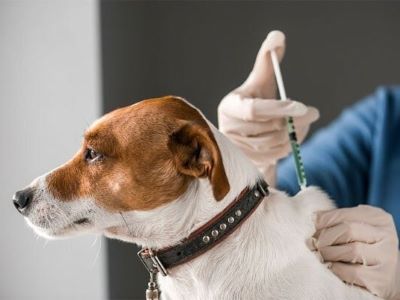Just like humans, dogs are also vulnerable to contagious diseases. They can spread among dogs and cause them serious illnesses. To prevent this there are vaccinations available, but “How much are dog vaccinations?“💉
There are many factors affecting vaccination costs and in this article, we are going to understand them, because dogs need to get proper care. Let’s see how can prevent contagious diseases in dogs while maintaining their health and safety.🐶

How Much Are Dog Vaccinations?
Dogs bring joy into our lives. As responsible pet parents, we must make their well-being a priority. By taking care of their immune system we are one step ahead in their taking care of them.
How do you take care of their immune system? One important way is – Vaccination! 💉
They prepare your dog’s immune system to recognize and fight harmful invaders in the form of viruses and bacteria, preventing the risk of serious diseases. There are mainly two types of Vaccines available, let’s see them in detail:
1. Core Vaccines
Here are some core vaccines[1]:
- Canine Distemper: A viral disease affecting multiple organs. Causes fever, coughing, and discharge from the eyes and nose. Severe cases can lead to neurological issues,🧠 in their skin, eyes and respiratory system.
- Canine Parvovirus: This is highly contagious and attacks the digestive system. Symptoms include vomiting, diarrhoea, and lethargy. Can be fatal, especially in puppies.
- Canine Adenovirus (Hepatitis): Hepatitis can be divided into two types: type 1 causes infectious canine hepatitis and type 2 causes respiratory infections. This affects the liver and other organs. Symptoms range from mild fever to severe liver damage.
- Rabies: A fatal viral disease affecting the nervous system. Transmitted through bites, with symptoms progressing rapidly. Vaccination is often legally required for dogs due to the public health risk in most countries.

2. Non-Core Vaccines
Here are some non-core vaccines:
- Bordetella (Kennel Cough): This causes persistent coughing and respiratory distress and this is particularly important for dogs in communal settings.
- Leptospirosis: A bacterial infection affecting the kidneys and liver. Dogs can contract it from contaminated water or soil.🦠
- Canine Influenza: Respiratory illness with symptoms like coughing and nasal discharge. Important for dogs in close contact with others.
- Lyme Disease: Transmitted through tick bites, causing joint pain and fever. Essential for dogs in tick-prone regions.
Remember, a healthy dog is a happy dog!
Side Effects of the Vaccines
Vaccination is a crucial step to keep your dogs healthy but at the same time, it is important to be aware of the possible side effects. 💉
Most dogs have minor side effects to vaccines like soreness, swelling, redness, mild fever, decreased activity, or vomiting/diarrhoea for 1-2 days. Sometimes some dogs can have facial swelling, breathing issues, long joint pain or gastrointestinal problems that need a visit from the vet.🧑⚕️
Extremely rarely, vaccines may cause serious life-threatening allergic reactions, injection-site cancer or shock, requiring quick emergency health care and hospitalization.

Overall, most dogs tolerate vaccines well with only mild short-lived side effects, but some monitoring is wise. Contact your vet if anything concerns you or lasts beyond 48 hours.
How to Minimize the Side-Effect Risk?
Make sure your dog is in good health before vaccination. Share your dog’s medical history, including any earlier negative reactions, with the vet. Keep an eye on your dog for the first few hours⌛ after vaccination.
Report any unique behaviour or symptoms quickly. Follow the recommended vaccination schedule according to your dog’s lifestyle and risk factors. Maintain open communication with your vet about any concerns or observations.
When to Start Dog Vaccinations?
Keeping your dog healthy starts with a vaccination routine. Understanding the suggestions for both puppies and adult dogs allows you to safeguard their well-being at every stage of life. Here is your schedule for their vaccination:
1. Puppy Vaccination Schedule: The early months represent a vulnerable time for puppies. Vaccination helps provide vital immunity against dangerous infectious diseases.
| Age | What’s Involved |
|---|---|
| 6-8 weeks | Initial round of core vaccines for distemper, parvovirus, adenovirus/hepatitis |
| 10-12 weeks | Second round of core vaccines + introduction of non-core vaccines (e.g. Bordetella, Leptospirosis) |
| 14-16 weeks | Final core vaccine💉 boosters to ensure robust immunity |
2. Adult Dog Vaccinations: After the initial puppy series, vets recommend a thorough examination and booster at 1 year and Follow-up boosters as needed based on lifestyle, health status, and regional disease risks.

While the frequency varies, adult dogs require ongoing boosters of certain core and non-core vaccines.
Core vaccines (distemper, adenovirus, parvovirus, rabies) are given typically every 1-3 years and Non-core vaccines are scheduled as per your dog's lifestyle, health, and regional disease patterns.
Factors Affecting Cost
There are various factors involved in deciding the cost of vaccination. The cost of vaccinating your dog can vary due to these factors. There are many options available as per your budget and also many plans to make it affordable.💰 Let’s see what are these factors in detail:
Urban vs. Rural Areas: Vet services in big cities tend to be more expensive due to higher operating costs, such as rent and utilities.
Veterinary care in rural areas may be more affordable as overhead costs are often lower.
Regional Differences: The vet’s expenses can vary based on the overall cost of living in a particular region.
Economic factors influence prices, areas with a higher cost of doing business may have higher costs.
General vs. Specialty Clinics: Standard clinics offer a range of services, including vaccinations, at lower costs.
Special clinics, focusing on specific medical areas, may charge higher vaccination💉 fees due to their expertise.
One exception is that emergency facilities or 24-hour pet hospitals often have higher exam and vaccination fees given their specialized services and hours compared to a regular vet office.
The best approach is to discuss expected vaccination costs upfront when establishing care with your chosen vet clinic. 🏥
Finding ways to fit important vaccines like rabies boosters into routine wellness exams can help manage budgets and ensure your dog receives the necessary immunizations to stay happy and healthy over their lifetime[2].

Maintaining protective antibody levels through proper vaccination is central to your dog’s well-being.
Vaccine Type
Vaccine Types differ from Core, Non-Core Vaccines, and Combination Vaccines. Some dog vaccines are essential, they protect against very serious common diseases like distemper and rabies.
Other non-essential vaccines depend on the dog’s lifestyle and location. Combination vaccines bundle protection against multiple diseases in one shot. This saves money and is less stressful for the dog compared to getting many individual vaccines.💉
You must focus first on core vaccines for severe illnesses. You can discuss combo vaccines with your vet to simplify protection. Also, check if vaccines are included in routine vet exam fees.
Getting the right vaccines is important for your dog’s health and safety!
Average Cost Breakdown
| Vaccination Stage💉 | Description | Average Cost Range💰 |
|---|---|---|
| Puppy Vaccination Costs | Initial Series | |
| 6-8 Weeks: Core vaccinations | £56.25 – £75 (including vet visit) | |
| 10-12 Weeks: Core and non-core vaccines | £56.25 – £75 | |
| 14-16 Weeks: Final core vaccinations | £56.25 – £75 | |
| Additional Boosters | ||
| 1 Year: Comprehensive check-up and boosters | £37.50 – £56.25 | |
| Regular Boosters: Every 1-3 years | £37.50 – £56.25 per booster | |
| Adult Dog Vaccination Costs | Annual or Triennial Boosters | |
| Every 1-3 Years: Core vaccinations | £37.50 – £56.25 per booster | |
| Non-Core Vaccines as Needed | ||
| Based on Lifestyle and Risk Factors | £18.75 – £37.50 per vaccine💉 | |
| Additional Considerations | Package Deals | |
| Comprehensive packages including core and non-core vaccines | £75 – £112.50 | |
| Wellness Plans | ||
| Plans covering vaccinations, check-ups, and preventive care | £225 – £375 per year |

Affordable Vaccination Options
Ensuring your dog stays up-to-date on shots is an important part of your responsibility. However, the costs can quickly add up, leaving pet parents in a tricky situation.
The good news is there are some ways to curb expenses when it comes to those life-saving vaccines. Many clinics offer good bundle rates on routine wellness plans or care packages. These schemes include essential exams, shots, and lab work for one monthly fee.📅
Additionally, joining with area veterinary school programs can provide another option.
Local Animal Shelters and Clinics
There are many places to get low-cost or even free vaccinations for your dog. Vaccines are often included with pet adoption fees as part of getting shelter dogs ready for new homes.
- Some neighbourhoods have special low-fee clinics just for pet vaccinations every so often. Check community boards for upcoming events. 📅
- Vaccines may be discounted or offered for free to help pets from rescues find new families. Many national chains collaborate with vets to hold vaccination events at local stores.
- Watch for posted clinic dates. Animal welfare groups sometimes arrange vaccination days with reduced pricing as a community service. 💉
- Local governments occasionally organize area-wide low-cost pet vaccination drives to improve public health.
- Keeping an eye out for these low-cost or free options can make it easier to get those essential shots for your dog within your budget. Every little bit helps when it comes to their health and preventing disease!
Wellness Plans and Packages
Some clinics offer wellness plans covering vaccines, regular check-ups, and prevention care at a fixed monthly or annual cost. 💸
These plans can result in significant cost savings for routine veterinary services. These packages sometimes offer discounts compared to one-time services.

Government and Nonprofit Programs
You can contact animal control services as there are chances to have low-cost or subsidized vaccination programs available.
These programs are designed to promote responsible pet ownership in the community. Humane societies and charitable organizations run programs for pets in need.
Reach out to these generous places for available services. These places play an important role in the pet population and promote overall health.
Importance of Regular Check-ups
Identify emerging health issues through weight/coat checks, dental exams, and vital sign reviews. Administer essential vaccines,💉 parasite control, and dental cleaning based on age and medical needs. Reveal illnesses through exams and testing before symptoms appear.
Allows for quicker, more effective treatment. Nutrition guidance and tracking growth/development ensure pets stay happy and healthy. Keeping up on preventative care provides their best shot at longevity.
FAQs
❓How Many Times Should I Deworm My Puppy?
Puppies should be wormed every two weeks until twelve weeks of age, then monthly until six months of age. Once they have reached six months, a puppy can transfer onto an ‘adult’ worming schedule. All adult dogs need to be wormed every three months for effective protection.
❓How Much Are Dog Vaccinations?
As a rough guide, you can expect to pay around £70 for puppy vaccinations or a little more if you are vaccinating against kennel cough. Your dog’s annual booster vaccinations should be a little cheaper, at around £50.
❓How Many Times a Dog Is Vaccinated?
Typically, adult dogs need to come in once a year for vaccines. Not every vaccine needs to be maintained every year. Once you’ve gotten the initial rabies and distemper series onboard, we booster these every three years. However annual vaccinations are for Lyme, leptospirosis, Bordatella, and canine influenza.
❓Is It Ok if I Don’t Vaccinate My Dog?
The American Animal Hospital Association calls vaccinations “a cornerstone of canine preventive healthcare” and recommends that all dogs (barring specific medical reasons), receive a core set of vaccines for rabies, distemper, adenovirus, parvovirus, and parainfluenza, and advises that many dogs receive additional non-core vaccinations for Lyme disease, Bordetella (which causes kennel cough), and other diseases.
❓What Is the 5-in-1 Vaccine for Dogs?
The canine 5-in-1 vaccine includes protection against canine distemper virus (indicated by the letter D), two types of adenovirus, aka hepatitis and kennel cough (named A, A2, or H), parainfluenza (P), and parvovirus (P).
Conclusion
In conclusion “How much are dog vaccinations?” Vaccination is important for a dog’s overall well-being. The cost of vaccinations depends on various factors.🔁
There are other feasible options available for you to give your pet. The science is clear – vaccines💉 save dog lives. Just as we count on others to contribute to public health, we too can “be the change” by keeping our dogs up-to-date.
Remember it is up to you to keep them happy and healthy!❤️🩹
Reference:
- Puppy vaccinations. (n.d.) | University of London | Royal Veterinary College
- Veterinary financial assistance in your local area (n.d.). | RSPCA.



